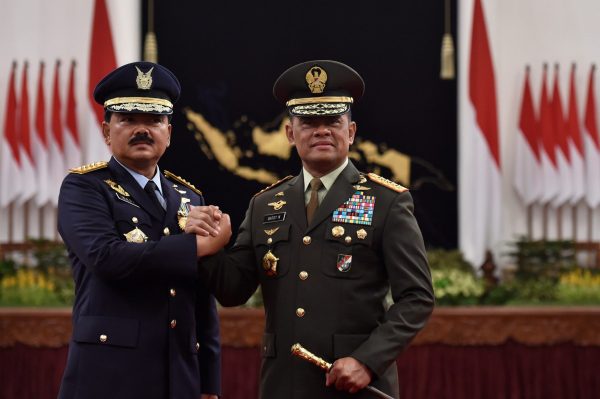The 4 December leadership changes were puzzling for at least two reasons. The timing of the reshuffle was sensitive: Gatot issued it shortly before he stepped down as commander-in-chief. The move was therefore seen as creating internal conflict and obstructing Hadi’s path by placing Gatot’s allies in key positions. Connie Rahakundini Bakrie, a defence expert from the University of Indonesia, called the reshuffle a ‘time bomb’, while watchdogs and NGOs viewed it as unethical.
In what was seen as a tit-for-tat move, on 19 December 2017 Hadi demoted 16 recently promoted high-ranking army officers. This unexpected step raised even more questions, of which most concerned Hadi’s replacements for the most influential positions such as the Kostrad commander — a role that involves leading joint annual exercises and other combined services activities. The speculation was rife about whether ACM Hadi saw Major General Sudirman as General Gatot’s man and therefore decided not to give him a strategic position in the army.
Hadi’s official statements following the reversal of Gatot’s 4 December reshuffle pointed to career development as the justification for this move, but his subsequent reshuffle on 4 January 2018 might confirm the earlier speculation as to his motivations. The main highlight of this reshuffle was the appointment of Agus Kriswanto, the former head of the army’s training school (Kodiklat), as the commander of Kostrad. Another was the promotion of Andika Perkasa, an area commander, who replaced Agus as head of Kodiklat. These positions are both stepping stones for an officer to become the politically important army chief of staff (KSAD).
Current KSAD Mulyono will retire in January 2019, which is the year of the presidential election. Kriswanto is unlikely to succeed Mulyono as KSAD because he too will be retiring in August 2018; hence, the appointment of Kriswanto as Kostrad commander looks to be a strategic move by Hadi and President Joko Widodo (Jokowi) to buy time before finding the right person or grooming a trusted officer for the KSAD position.
Perkasa likely falls into the latter category: many observers believe he is being groomed for the position of KSAD in the near future. His career soared under Jokowi due to his personal relationship with former president Megawati’s confidant Abdullah Mahmud Hendropriyono, who (aside from being a retired general) is also a trusted adviser of Jokowi
Perkasa came into prominence after his promotion to commander of the presidential security detail in 2014. His credentials for this position were questionable as he had spent most of his military career studying overseas and thus lacked operational experience. His recent rotation as the head of Kodiklat means that he has been promoted to the rank lieutenant general, which makes him the most senior officer among his cohort. If Hadi does promote Perkasa to KSAD, this could draw criticism within military circles and raise public concerns..
The path from Kodiklat head to KSAD is not definite, but it is common. Gatot and Mulyono both served in Kodiklat as head and deputy respectively before rising to Kostrad commander and finally to KSAD. If Perkasa follows the paths taken by Gatot and Mulyono, he will likely replace Agus as Kostrad chief when the latter retires in August 2018 in order to prepare for KSAD.
As Jokowi eyes a second term, having ‘his man’ as KSAD would help strengthen his grip over the military, allowing him to spend political capital elsewhere.
Chaula Anindya is a Research Analyst and Satrio Dwicahyo a Research Associate with the Indonesia Programme, S. Rajaratnam School of International Studies (RSIS), Nanyang Technological University, Singapore.
A version of this article was first published here by RSIS.

